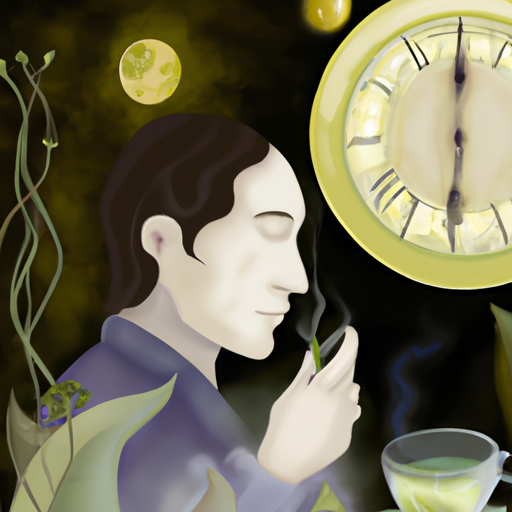Dealing with arthritis pain can be extremely difficult, causing everyday tasks to feel overwhelming. Having personally experienced the struggles of arthritis, I know the constant quest for relief.
Thankfully, nature offers a powerful ally in the form of herbal teas. These time-honored remedies have been used for centuries to combat inflammation and ease joint discomfort.
Just as the ancient healers sought solace in natural remedies, we too can turn to the power of herbal tea to find relief. By harnessing the healing properties of plants such as turmeric, ginger, and chamomile, we can alleviate arthritis pain and improve our overall quality of life.
In this article, I will explore the top herbal teas that have been scientifically proven to effectively reduce arthritis pain. From the anti-inflammatory properties of turmeric tea to the analgesic effects of white willow bark tea, we will delve into the evidence-based benefits of each herbal remedy.
So, grab your favorite mug, steep a cup of tea, and let’s embark on a journey towards a life free from the shackles of arthritis pain.
Key Takeaways
- Turmeric tea, ginger tea, green tea, and nettle tea are all good herbal teas for arthritis pain relief.
- These teas contain key components such as curcumin, gingerols, antioxidants, and vitamins/minerals that help reduce inflammation and improve joint function.
- Herbal teas can protect joints from damage caused by free radicals, alleviate arthritis pain, and slow down the progression of the condition.
- When preparing herbal teas, it is important to follow the recommended steeping instructions and consult with a healthcare provider before making any changes to a treatment plan.
Turmeric Tea
If you’re looking for a natural remedy to alleviate arthritis pain, turmeric tea is a fantastic choice! Turmeric has been used for centuries in traditional medicine to treat various ailments, including arthritis. The main active compound in turmeric, called curcumin, has anti-inflammatory and antioxidant properties, which can help reduce joint pain and swelling associated with arthritis.
One of the key benefits of turmeric tea is its ability to reduce inflammation. Inflammation plays a significant role in the development and progression of arthritis, and by incorporating turmeric tea into your daily routine, you may experience a decrease in pain and stiffness. Additionally, turmeric tea can also help improve joint flexibility and mobility, allowing you to better manage your arthritis symptoms.
To make turmeric tea, you’ll need the following ingredients: 1 teaspoon of ground turmeric, 1 cup of boiling water, a pinch of black pepper (to enhance the absorption of curcumin), and honey or lemon (optional) for taste. Simply add the turmeric and black pepper to the boiling water, let it steep for about 10 minutes, and then strain the tea. You can sweeten it with honey or add a squeeze of lemon for added flavor.
Transitioning to the next section, ginger tea is another herbal remedy that has been shown to provide relief for arthritis pain.
Ginger Tea
You’ll be surprised at how much relief you can get from sipping on a steaming cup of ginger-infused goodness. Ginger tea has been used for centuries as a natural remedy for various ailments, including arthritis pain.
When brewed properly, this herbal tea can provide numerous health benefits that can help alleviate inflammation and joint discomfort.
Here are three reasons why ginger tea is beneficial for arthritis pain:
-
Anti-inflammatory properties: Ginger contains compounds called gingerols, which have potent anti-inflammatory effects. These compounds can help reduce the inflammation in your joints that causes pain and stiffness.
-
Pain relief: Ginger has analgesic properties that can help relieve pain associated with arthritis. Drinking ginger tea regularly can help manage the discomfort and improve your overall quality of life.
-
Improved circulation: Ginger tea can promote better blood circulation, which is essential for proper joint health. Improved circulation can help deliver nutrients and oxygen to your joints, reducing pain and promoting healing.
Incorporating ginger tea into your daily routine can be a simple and effective way to manage arthritis pain. However, it’s important to consult with your healthcare provider before making any changes to your treatment plan.
Now, let’s move on to the next section about the benefits of green tea for arthritis pain.
Green Tea
Green tea, with its rich antioxidants, can provide relief and improve the overall well-being of those suffering from joint discomfort caused by arthritis. One of the key benefits of green tea is its ability to reduce inflammation in the body. Inflammation is a major contributor to the pain experienced by arthritis patients, and by reducing it, green tea can help alleviate some of that pain.
The antioxidants found in green tea, particularly a compound called epigallocatechin-3-gallate (EGCG), have been shown to have anti-inflammatory properties. EGCG can inhibit the production of inflammatory molecules in the body, thereby reducing inflammation and the associated pain.
In addition to its anti-inflammatory effects, green tea has been found to have other benefits for arthritis sufferers. It can help improve joint function and mobility, as well as reduce the risk of developing rheumatoid arthritis. Green tea also contains polyphenols, which have been shown to have a protective effect on cartilage, the tissue that cushions our joints.
Transitioning into the subsequent section about chamomile tea, it’s important to explore other herbal teas that may offer relief for arthritis pain.
Chamomile Tea
Transitioning to chamomile tea, it’s fascinating to note that a study found that regularly consuming this soothing beverage was associated with a 22% lower risk of developing joint discomfort caused by arthritis.
Chamomile tea, derived from the daisy-like flowers of the chamomile plant, has been used for centuries to alleviate various ailments, including arthritis pain. This herbal tea contains compounds with anti-inflammatory properties that can help reduce swelling and relieve joint pain.
The benefits of chamomile tea extend beyond its anti-inflammatory effects. It’s also known for its calming properties, which can help reduce stress and promote better sleep. Adequate rest and relaxation are crucial for managing arthritis pain, as they allow the body to heal and repair damaged tissues.
When it comes to dosage, there’s no set recommendation for chamomile tea. However, it’s generally safe for most people to consume 1-2 cups of chamomile tea per day. It’s important to note that individual responses may vary, so it’s best to start with a small amount and gradually increase if desired.
With chamomile tea offering such promising benefits, it’s time to explore another herbal option for arthritis pain relief: peppermint tea.
Peppermint Tea
Take a sip of refreshing peppermint tea and let the cool, tingling sensation wash over your senses, transporting you to a minty oasis of relief. Peppermint tea is not only a delicious and soothing beverage but also offers several benefits for arthritis pain. The menthol present in peppermint leaves has been found to possess anti-inflammatory properties, which can help reduce the swelling and pain associated with arthritis. Additionally, peppermint tea acts as a natural muscle relaxant, providing relief from muscle tension and stiffness often experienced by arthritis patients.
To give you a visual representation of the potential benefits of peppermint tea for arthritis pain, here is a table:
| Peppermint Tea Benefits |
|---|
| Reduces inflammation |
| Relieves muscle tension |
| Soothes arthritis pain |
To make your own peppermint tea, simply steep a handful of fresh peppermint leaves in hot water for about 5-10 minutes. You can also add a teaspoon of honey or lemon juice for added flavor. Enjoy this warm and soothing beverage daily to experience its potential benefits for arthritis pain relief.
Now, let’s move on to the next herbal tea that may help alleviate arthritis pain: nettle tea.
Nettle Tea
For a refreshing twist on your beverage routine, why not try incorporating nettle tea into your daily routine? Not only does nettle tea offer a unique flavor, but it also provides numerous benefits for arthritis pain relief.
Here are three reasons why nettle tea can be a great addition to your arthritis pain management plan:
-
Natural anti-inflammatory properties: Nettle tea contains compounds that’ve been shown to reduce inflammation in the body, which can help alleviate arthritis pain. By regularly consuming nettle tea, you may experience a decrease in joint swelling and discomfort.
-
Rich in vitamins and minerals: Nettle tea is packed with vitamins and minerals that’re essential for joint health. It contains high levels of calcium, magnesium, and vitamin K, all of which play a crucial role in maintaining strong and healthy joints.
-
Antioxidant effects: The antioxidants found in nettle tea can help protect your joints from damage caused by free radicals. By reducing oxidative stress, nettle tea may help slow down the progression of arthritis and provide relief from pain.
To prepare nettle tea for maximum effectiveness, simply steep one teaspoon of dried nettle leaves in hot water for 5-10 minutes. You can sweeten the tea with honey or add a squeeze of lemon for added flavor.
Transitioning into the subsequent section about ‘white willow bark tea,’ it’s important to explore other herbal options for arthritis pain relief.
White Willow Bark Tea
When it comes to natural pain relief, white willow bark is a key player. This herbal remedy has been used for centuries to alleviate joint pain. Brewing white willow bark tea is a simple and effective way to harness its pain-relieving properties.
Natural pain relief from white willow bark
If you want a natural way to relieve arthritis pain, white willow bark is like a miracle worker. This herbal remedy has been used for centuries as a natural alternative for pain relief. White willow bark contains a compound called salicin, which is similar to the active ingredient found in aspirin. It works by reducing inflammation in the body, which can help alleviate joint pain associated with arthritis.
To give you a better idea of the benefits of white willow bark, here’s a comparison table:
| White Willow Bark | Aspirin |
|---|---|
| Natural | Synthetic |
| Holistic remedy | Medication |
| Fewer side effects | Potential side effects |
It’s important to note that white willow bark should be used with caution, especially if you have any underlying health conditions or are taking other medications. It’s always best to consult with your healthcare provider before trying any new holistic remedies.
Now, let’s move on to brewing white willow bark tea for joint pain relief.
Brewing white willow bark tea for joint pain relief
To brew white willow bark tea for relieving joint pain, you’ll want to start by gathering the necessary ingredients. Here’s what you’ll need:
- White willow bark: This powerful herb contains salicin, a natural compound that has anti-inflammatory properties, which can help alleviate joint pain.
- Water: Use filtered or spring water to ensure a pure and clean taste.
- Tea infuser or strainer: This will help you steep the white willow bark effectively.
- Honey or lemon (optional): These ingredients can enhance the flavor of the tea and provide additional health benefits.
Brewing white willow bark tea is a simple process. Start by bringing water to a boil, then add the white willow bark to a tea infuser or strainer. Place the infuser or strainer in a cup and pour the hot water over it. Let it steep for 10-15 minutes, then remove the infuser or strainer. You can add honey or lemon to taste if desired. Enjoy this soothing tea as a natural remedy for joint pain.
Now, let’s explore the benefits of boswellia tea.
Boswellia Tea
Boswellia tea, with its soothing properties, can be a comforting ally in the battle against arthritis pain. Derived from the Boswellia serrata tree, this herbal tea has been used for centuries in traditional medicine for its numerous health benefits.
Boswellia tea is known for its anti-inflammatory properties, which can help reduce joint pain and swelling associated with arthritis. It contains compounds called boswellic acids, which have been found to inhibit the production of inflammatory chemicals in the body.
To make Boswellia tea, start by boiling water and adding a teaspoon of dried Boswellia resin to a tea infuser or teapot. Let it steep for about 10 minutes to allow the active compounds to be released. You can add honey or lemon to enhance the flavor if desired. Sip on this warm and soothing tea a few times a day to experience its potential benefits for arthritis pain relief.
Transitioning to the next topic, rosehip tea, it’s another herbal tea that has gained popularity for its potential benefits in managing arthritis pain.
Rosehip Tea
Derived from the fruit of the wild rose plant, rosehip tea offers a potential natural remedy for individuals seeking relief from the discomfort and inflammation associated with arthritis. This herbal tea is packed with beneficial compounds that can help alleviate arthritis pain and improve joint health.
Here are some key benefits of rosehip tea:
-
Anti-inflammatory properties: Rosehip tea contains anti-inflammatory compounds like polyphenols and flavonoids, which can help reduce inflammation in the joints and relieve arthritis pain.
-
Rich in antioxidants: Rosehip tea is abundant in vitamin C and other antioxidants, which can help protect the joints from further deterioration. These antioxidants are essential for fighting oxidative stress and preventing damage to the joints.
-
Boosts immune system: The high vitamin C content in rosehip tea strengthens the immune system, which is important for individuals with arthritis as it can help prevent complications and infections.
-
Supports joint health: Rosehip tea is rich in vitamins, minerals, and essential fatty acids that are beneficial for maintaining healthy joints. It can help improve flexibility, reduce stiffness, and promote overall joint mobility.
To make rosehip tea, simply steep dried rosehips in boiling water for about 10 minutes. You can add honey or lemon for taste if desired.
Transitioning to the next section, another herbal tea that can provide relief for arthritis pain is devil’s claw tea.
Devil’s Claw Tea
Moving on to the next option, let’s explore the soothing effects of devil’s claw tea for addressing discomfort related to joint issues. Devil’s claw, scientifically known as Harpagophytum procumbens, is a medicinal plant native to southern Africa. It has been traditionally used for centuries to alleviate arthritis pain and inflammation.
Devil’s claw contains active compounds like harpagoside and harpagide, which possess anti-inflammatory properties. These compounds inhibit the production of inflammatory markers, such as prostaglandins, reducing pain and swelling in arthritic joints. Additionally, devil’s claw may also help improve joint stiffness and mobility, allowing individuals to engage in daily activities more comfortably.
When it comes to the dosage of devil’s claw tea, it is crucial to follow the recommended guidelines. The usual dosage is 1.5-4 grams of dried devil’s claw root per day, divided into two or three doses. However, it is always advisable to consult with a healthcare professional before starting any herbal treatment, especially if you have any underlying medical conditions or are taking other medications.
To summarize, devil’s claw tea offers potential benefits for managing arthritis pain and inflammation. However, it is essential to use it responsibly and under professional guidance to ensure its safe and effective use.
Frequently Asked Questions
Can herbal teas completely cure arthritis pain?
Herbal teas can provide relief for arthritis pain, but they can’t completely cure the condition. They offer various benefits, such as reducing inflammation and easing discomfort.
While herbal teas can be a helpful part of alternative treatments for arthritis, it’s important to remember that they shouldn’t replace medical advice or prescribed medications. It’s always best to consult with a healthcare professional to create a comprehensive treatment plan for managing arthritis pain.
Are there any potential side effects of drinking herbal teas for arthritis pain?
When considering herbal teas for arthritis pain, it’s important to be aware of potential risks and interactions with medication. For example, a case study reported that a patient experienced increased bleeding while taking blood-thinning medication and drinking chamomile tea. This highlights the need for caution and consulting with a healthcare professional.
While herbal teas can offer relief, it’s crucial to prioritize safety and monitor for any adverse effects, especially when using them alongside other medications.
How frequently should I drink herbal tea to see a noticeable improvement in arthritis pain?
To see a noticeable improvement in arthritis pain, I recommend drinking herbal tea regularly. The frequency of consumption depends on individual preferences and tolerance, but consuming herbal tea for arthritis pain two to three times a day may be beneficial.
Some recommended herbal teas for arthritis pain include ginger tea, turmeric tea, and green tea. These teas have anti-inflammatory properties that may help alleviate arthritis symptoms when consumed consistently.
It’s important to consult with a healthcare professional before making any changes to your diet.
Can I mix different herbal teas together to enhance their effectiveness for arthritis pain relief?
Mixing different herbal teas together can be a delightful way to enhance their effectiveness for relieving arthritis pain. By combining various herbal tea combinations, you can create a powerful blend that targets inflammation and soothes joint discomfort.
Experiment with herbs like turmeric, ginger, boswellia, and green tea, which’ve shown promising results in alleviating arthritis symptoms. Remember to consult with a healthcare professional to ensure the safety and suitability of the herbal teas for your specific condition.
Are there any precautions or contraindications for drinking herbal teas for arthritis pain, especially if I’m taking medication for arthritis?
There are certain precautions and contraindications to consider when drinking herbal teas for arthritis pain, particularly if you’re already taking medication for arthritis. It’s important to consult with your healthcare provider before incorporating herbal teas into your regimen.
Some herbal teas may interact with arthritis medications, potentially causing adverse effects or reducing the effectiveness of the medication. Your healthcare provider can provide personalized guidance and ensure the safe use of herbal teas alongside your arthritis medication.
Conclusion
In conclusion, when it comes to finding relief from arthritis pain, herbal teas can be a great natural option. Turmeric tea, with its anti-inflammatory properties, may help reduce joint pain. Ginger tea is known for its pain-relieving abilities and can provide soothing relief.
Green tea contains antioxidants that may help reduce inflammation and provide overall joint support. Chamomile tea has calming properties that can help ease arthritis-related stress and promote relaxation. Peppermint tea may help relax muscles and reduce pain.
White willow bark tea, boswellia tea, rosehip tea, and devil’s claw tea are other herbal options worth exploring. As the saying goes, "prevention is better than cure," incorporating these herbal teas into your routine may help manage arthritis pain and improve your overall well-being.










